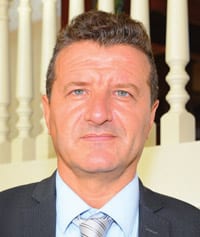

- Massimiliano Cirelli
- Managing Director - Head of Cash Management Sales Corporate Italy, UniCredit
by Alessandro Nesti, Financial Activities Corporate Director, Menarini Group
Pharmaceutical company Menarini Group has a strong reputation for quality and innovation across the 100 countries in which it has operations, developed over many years. To support the ongoing expansion of the business, Menarini’s group treasury embarked on a project in 2012 with UniCredit to rationalise bank relationships, centralise cash and liquidity management, and streamline financial processes both in Eastern Europe and in Italy. In this article, Alessandro Nesti, Financial Activities Corporate Director, Menarini Group describes the background to the project, Menarini’s achievements and future plans.
Project background
Before embarking on this project, we had a decentralised approach to cash and liquidity management in our major Central & Eastern European (CEE) locations that are part of our subsidiary company Berlin Chemie, with local operations in each subsidiary, and cash held in a large number of bank accounts with multiple banks and in different currencies. This created particular challenges, as it was difficult to establish consistent, complete visibility over cash, and to leverage group liquidity effectively. For example, cash surpluses in one entity needed to be transferred manually to fund deficits in another, resulting in considerable administrative effort and inefficiency. Furthermore, there were credit and operational risks associated with holding balances in local entities and accounts. In Italy, although cash management for the ten Italian subsidiaries was centralised, we lacked the ability to sweep cash balances into a single account automatically. It therefore took considerable time and resources to undertake this process manually, with a high probability of error.
Adopting a centralised approach
In 2012, we decided to launch a project to centralise funds across the Berlin Chemie subsidiaries in Central & Eastern Europe (CEE), and to automate cash centralisation in Italy. Our aim was to establish timely, accurate visibility and control over cash, increase financial efficiency and reduce risk. In addition we would be able to rationalise our banking relationships, close a large number of redundant bank accounts, and extend our relationship with UniCredit from being our domestic partner bank in Italy to become our CEE cash management bank. We already had a well-established relationship with UniCredit, and recognised the bank’s experience in designing and implementing efficient liquidity management structures. The bank’s network matched the Berlin Chemie footprint in CEE, which includes Austria, Romania, Slovenia, Czech Republic and Poland.

We implemented pool accounts in each entity in CEE and Italy with UniCredit which are automatically zero-balanced to/from the header account at the end of each business day. This enables treasury to take full control of group cash across the countries belonging to the Berlin Chemie Group, without the need to conduct manual transfers. We also implemented UniCredit’s electronic banking system, UniWeb in Italy, which provides us with full, real-time visibility over cash flows across all of our Italian subsidiaries. UniWeb is also used by each of these participating entities to monitor balances and flows, and in some cases they are responsible for local payments, which they also conduct via UniWeb.

Overcoming challenges
There are a number of challenges to consider when rationalising bank relationships and centralising cash and liquidity via a cash pool. The most significant obstacle is resistance from subsidiaries that are concerned about the loss of autonomy and control over local cash. We overcame this by explaining that as the primary goal of each subsidiary is to grow the business rather than expending resources on managing cash, the project would enable them to redirect these resources to supporting and developing their business activities. We also received considerable support from UniCredit’s cash management team, which has a local-language, expert presence in each of the relevant countries in CEE as well as Italy. The team offered support to each local entity and helped to overcome some of the initial resistance as well as ensuring a smooth transition. This team was co-ordinated by a single project manager and the global sales manager who managed the relationship throughout.[[[PAGE]]]
Project outcomes
Despite some of these challenges, the project to migrate from a group of treasuries to a group treasury has been very successful. We now have a consistent, real-time view of cash at both subsidiary and group treasury levels, and financial and operational efficiency has improved significantly. For example, the cost of funding has been reduced, while surplus cash in each currency can be invested centrally in line with corporate policy. Similarly, we have reduced counterparty risk and minimised the need for subsidiaries to dedicate local resources to cash and treasury management.
In Italy, as our domestic cash pool has resulted in the concentration of financial flows in the master account with UniCredit, we have been able to close a large number of bank accounts, resulting in significant savings both in bank charges and internal resources.
There have also been advantages from a compliance perspective. The project coincided with the SEPA (Single Euro Payments Area) migration, so we combined the cash pooling initiative with SEPA compliance, including transition to SEPA credit transfers (SCT) and direct debits (SDD). Once again, this was closely supported by UniCredit. The bank was instrumental in helping to overcome complexity and diversity in each country and achieving a harmonised approach to payments and collections. We received considerable support from UniCredit in establishing the relevant procedures and documentation to be able to use SDD as an efficient collections tool.
Future plans
We are currently working with UniCredit to assess opportunities to expand the cash pooling solution in CEE further, including Russia. We will then consider implementing liquidity optimisation solutions in other regions in line with the ongoing development of the Menarini Group.
We are also seeking to further enhance efficiency in Europe by implementing UniCredit’s global electronic banking tool, EuropeanGate. This should allow us to improve controls with centrally defined user profiles, and support a European payment factory with substantial savings of its banking costs.











